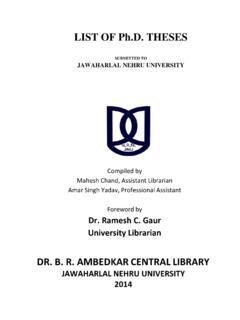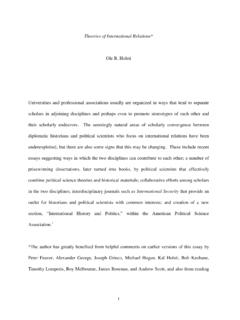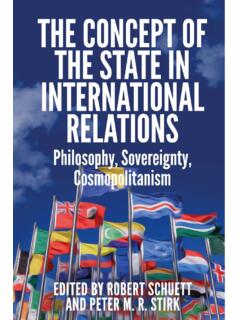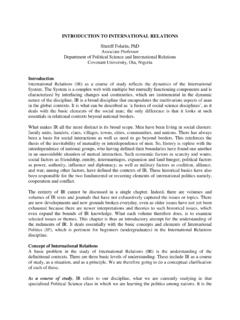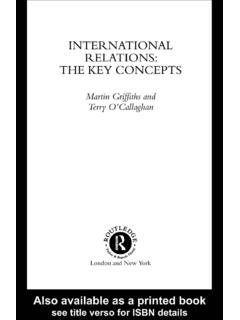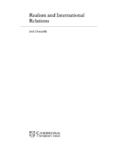Transcription of Theories of International Relations
1 Theories of InternationalRelationsThird editionScott Burchill, Andrew Linklater, Richard Devetak, Jack Donnelly, Matthew Paterson, Christian Reus-Smit and Jacqui TrueTheories of International RelationsThis page intentionally left blank Theories ofInternationalRelationsThird editionScott Burchill, Andrew Linklater,Richard Devetak, Jack Donnelly,Matthew Paterson, ChristianReus-Smit and Jacqui TrueMaterial from 1st edition Deakin University 1995, 1996 Chapter 1 Scott Burchill 2001, Scott Burchill and Andrew Linklater 2005 Chapter 2 Jack Donnelly 2005 Chapter 3 Scott Burchill, Chapters 4 and 5 Andrew Linklater,Chapters 6 and 7 Richard Devetak, Chapter 8 Christian Reus-Smit,Chapter 9 Jacqui True, Chapter 10 Matthew Paterson 2001, 2005 All rights reserved. No reproduction, copy or transmission of this publication may be made without written paragraph of this publication may be reproduced, copied or transmitted save with written permission or in accordance with the provisions of the Copyright, Designs and Patents Act 1988, or under the terms of any licence permitting limited copying issued by the Copyright Licensing Agency, 90 Tottenham Court Road, London W1T person who does any unauthorized act in relation to this publication may be liable to criminal prosecution and civil claims for authors have asserted their rights to be identified as the authors of this work in accordance with the Copyright,Designs and Patents Act edition 1996 Second edition 2001 Published 2005 byPALGRAVE MACMILLANH oundmills, Basingstoke, Hampshire RG21 6XS and175 Fifth Avenue, New York.
2 10010 Companies and representatives throughout the MACMILLAN is the global academic imprint of the Palgrave Macmillan division of St. Martin s Press, LLC and of Palgrave Macmillan is a registered trademark in the United States, United Kingdom and other countries. Palgrave is a registered trademark in the European Union and other : 978 1 4039 4865 6 hardbackISBN-10: 1 4039 4865 8 hardbackISBN-13: 978 1 4039 4866 3 paperbackISBN-10: 1 4039 4866 6 paperbackThis book is printed on paper suitable for recycling and made from fully managed and sustained forest catalogue record for this book is available from the British of Congress Cataloging-in-Publication DataTheories of International Relations / Scott Burchill .. [et al.]. 3rd bibliographical references and : 978 1 4039 4865 6 (cloth)ISBN-10: 1 4039 4865 8 (cloth)ISBN-13: 978 1 4039 4866 3 (pbk.)ISBN-10: 1 4039 4866 6 (pbk.)1. International Relations Philosophy. I. Burchill, Scott, 1961 01 dc22200504373710987 654 32114 13 12 11 10 09 08 07 06 05 Printed in ChinaContentsPreface to the Third EditionviiiList of AbbreviationsixNotes on the Contributorsx1 Introduction 1 Scott Burchill and Andrew Linklater Frameworks of analysis 1 Diversity of theory 2 Contested nature 5 The foundation of International Relations 6 Theories and disciplines 9 Explanatory and constitutive theory 15 What do Theories of International Relations differ about?
3 18 Evaluating Theories 232 Realism 29 Jack DonnellyDefining realism 30 Hobbes and classical realism 32 Waltz and structural realism34 Motives matter 40 Process, institutions and change 44 Morality and foreign policy 48 How to think about realism (and its critics) 523 Liberalism 55 Scott Burchill After the Cold War 55 Liberal internationalism: inside looking out 57 War, democracy and free trade 58 Economy and terrorism 70 Conclusion 81v4 The English School 84 Andrew Linklater From power to order: International society 89 Order and justice in International Relations 93 The revolt against the West and the expansion of International society 98 Progress in International Relations 103 Conclusion 1085 Marxism 110 Andrew Linklater Class.
4 Production and International Relations in Marx s writings 112 Nationalism and imperialism 120 The changing fortunes of Marxism in International Relations 124 Marxism and International Relations theory today 132 Conclusion 1356 Critical Theory 137 Richard Devetak Origins of critical theory 137 The politics of knowledge in International Relations theory 140 Rethinking political community 146 Conclusion 1597 Postmodernism 161 Richard Devetak Power and knowledge in International Relations 162 Textual strategies of postmodernism 167 Problematizing sovereign states 171 Beyond the paradigm of sovereignty: rethinking the political 181 Conclusion 1878 Constructivism 188 Christian Reus-Smit Rationalist theory 189 The challenge of critical theory 193 Constructivism194viContentsConstructivis m and its discontents 201 The contribution of constructivism 205 Constructivism after 9/11 207 Conclusion 2119 Feminism 213 Jacqui True Empirical feminism 216 Analytical feminism 221 Normative feminism 228 Conclusion 23210 Green Politics235 Matthew Paterson Green political theory 237 Global ecology 238 Ecocentrism
5 238 Limits to growth, post-development 239 Green rejections of the state-system 242 Objections to Green arguments for decentralization 246 Greening global politics? 248 Conclusions 254 Bibliography258 Index289 ContentsviiPreface to the Third EditionLike its predecessors, the third edition is intended to provide upper-levelundergraduates and postgraduates with a guide to the leading theoreticalperspectives in the origins of the project lie in the development by Deakin Universityof a distance-learning course in 1995: early versions of several chapterswere initially written for the course guide for this. The first edition ofthis book brought together substantially revised versions of these withnew chapters on Feminism and Green Politics. The second edition addeda further chapter on Constructivism. None of those involved in the pro-ject at the outset guessed that the result would be quite such a successfultext as this has turned out to be, with course adoptions literally all overthe third edition has again been substantially improved.
6 For thisedition, Jack Donnelly has written a new chapter on the varieties ofRealism. Jacqui True has produced what is virtually a new chapter onFeminism. Andrew Linklater s chapter on the English School replacesthe one on Rationalism which he contributed to the first and secondeditions. All chapters, however, have been revised and updated to reflectdevelopments in the literature and to take account, where appropriate,of the significance of 9/11 for Theories of world politics. The thirdedition also includes a significantly revised introduction on the impor-tance of International Relations theory for students of world but not least, the whole book has been redesigned, consistencybetween chapters in style and presentation has been improved, and aconsolidated bibliography has been added with Harvard referencesreplacing notes with the earlier editions, our publisher, Steven Kennedy has beenkeenly involved in every stage of the production of this book.
7 We aregrateful once again for his unfailing commitment and wise also to Gary Smith of Deakin University and Dan Flitton fortheir contributions to earlier editions. Above all we would like to thankour co-authors for their hard work and of AbbreviationsAPECAsia Pacific Economic CooperationCNDC ampaign for Nuclear Disarmament (UK)FDIF oreign direct investmentGADG ender and developmentGPTG reen political theoryICCI nternational Criminal CourtICJI nternational Court of JusticeIOInternational organizationILOI nternational Labour OrganizationIMFI nternational Monetary FundIPEI nternational Political EconomyIUCNI nternational Union for the Conservation of Nature andNatural ResourcesMAIM ultilateral Agreement on InvestmentsMNCM ultinational corporationNAFTA North American Free Trade AgreementNATON orth Atlantic Treaty OrganizationNGONon-governmental organizationNTBNon-trade barrierOECDO rganization for Economic Cooperation and DevelopmentSAPS tructural adjustment policy (IMF)
8 TNCT ransnational corporationUNCED United Nations Conference on Environment and DevelopmentUNDPU nited Nations Development ProgrammeWCEDW orld Commission on Environment and DevelopmentWHOW orld Health OrganizationWMDW eapons of mass destructionWTOW orld Trade OrganizationWIDW omen in International developmentixNotes on the ContributorsScott Burchillis Senior Lecturer in International Relations , DeakinUniversity, Devetakis Lecturer in Politics, Monash University, Donnellyis Andrew W. Mellon Professor of Political Science,University of Denver, Linklateris Woodrow Wilson Professor of InternationalPolitics, University of Wales, Aberystwyth, Patersonis Associate Professor of Political Science, Universityof Ottawa, Reus-Smitis Professor of International Relations , AustralianNational University, Trueis Lecturer in International Politics, University of Auckland,New 1 IntroductionSCOTT BURCHILL AND ANDREW LINKLATERF rameworks of analysisThe study of International Relations began as a theoretical of the foundational texts in the field, E.
9 H. Carr s, The Twenty Years Crisis(first published in 1939) and Hans Morgenthau s Politics AmongNations(first published in 1948) were works of theory in three centralrespects. Each developed a broad framework of analysis which distilledthe essence of International politics from disparate events; each soughtto provide future analysts with the theoretical tools for understandinggeneral patterns underlying seemingly unique episodes; and each reflectedon the forms of political action which were most appropriate in a realmin which the struggle for power was pre-eminent. Both thinkers weremotivated by the desire to correct what they saw as deep misunder-standings about the nature of International politics lying at the heart ofthe liberal project among them the belief that the struggle for powercould be tamed by International law and the idea that the pursuit of self-interest could be replaced by the shared objective of promoting securityfor all.
10 Not that Morgenthau and Carr thought the International politi-cal system was condemned for all time to revolve around the relentlessstruggle for power and security. Their main claim was that all efforts toreform the International system which ignored the struggle for powerwould quickly end in failure. More worrying in their view was the dan-ger that attempts to bring about fundamental change would compoundthe problem of International Relations . They maintained the liberal inter-nationalist world-view had been largely responsible for the crisis of theinter-war scholars, particularly in United States in the 1960s, believedthat Morgenthau s theoretical framework was too impressionistic innature. Historical illustrations had been used to support rather thandemonstrate ingenious conjectures about general patterns of internationalrelations. In consequence, the discipline lagged significantly behind thestudy of Economics which used a sophisticated methodology drawnfrom the natural sciences to test specific hypotheses, develop general1laws and predict human behaviour.

